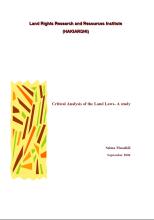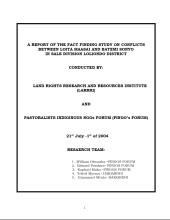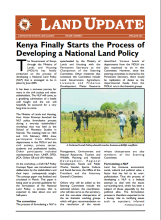Land Library Search
Through our robust search engine, you can search for any item of the over 73,000 highly curated resources in the Land Library.
If you would like to find an overview of what is possible, feel free to peruse the Search Guide.
/ library resources
Showing items 1 through 9 of 14.Moçambique é um dos países da SADC que ainda possui consideráveis recursos florestais e faunísticos. Estes recursos são de especial importância para o país, pela sua dimensão ambiental, social e económica.
The report of the Presidential Commission of Inquiry into the Illegal/Irregular Allocation of Public Land is finally out!
Includes a series of interviews on the theme, ‘How should the Ndungu Report recommendations be implemented? – what Kenyans say.’ Also includes some of the the Ndungu Report’s recommendations.
AFRA’s work at Ekuthuleni started in 1998. It’s now 2004, six years later, and we have to confess that we have failed. It is not possible to secure tenure at Ekuthuleni, for the purposes for which people want that security, within the current legal, technical and institutional frameworks.
Although The National Land Policy Formulation Process is concentrated on addressing land issues, the reform agenda requires inter- alia that there are policy directions for establishing an equitable framework for economic growth and access to natural resources.
The task at hand entails the critical review of the Land Laws of Tanzania, chiefly Act No.4 and Act No.5, 1999 and their subsequent revisions. This could not be done out of context, or by confining oneself solely to the statutes.
Civil society formations in Africa have historically played an important part in the establishment of organising people in the pursuit of common goals.
The conflict for which the research team has taken immediate measures to find its causes and give recommendations for its complete arrest, took place from the 1st-14th July 2004 in the frontiers of Engusero Sambu and Kisangiro villages, in the divisions of Loliondo and Sale, respectively, both of
The Government of Kenya through the Ministry of Lands and Housing (MOLH) has finally embarked on the process of developing a National Land Policy (NLP) that is envisaged to be in place by June 2005.








